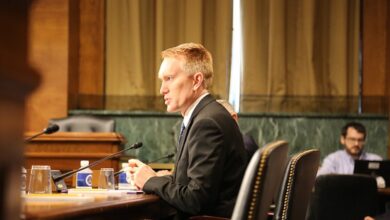Maine Gov. vetoes bill that would have banned LGBT therapy
The governor of Maine has vetoed a controversial bill that would ban “conversion therapy,” also known as reparative therapy, for LGBT minors. Numerous former LGBT individuals had come out against the bill saying the therapy allowed them to change their lifestyle.
Gov. Paul LePage (R-ME) became the first governor on either side of the political aisle to say “no” to a bill preventing gay individuals from seeking help. An effort to override his veto fell short in the state House of Representatives.
“Conversion therapy is defined in LD 912 as ‘any practice or course of treatment that seeks to change an individual’s sexual orientation or gender identity including … any effort to change gender expression or to eliminate or reduce sexual or romantic attractions or feelings toward individuals of the same gender,'” LePage explained in his veto letter to the Maine legislature.
“I am vetoing LD 912 because it is bad public policy,” the governor continued. “This bill attempts to regulate professionals who already have a defined scope of practice and standard of care per their statutory licensing requirements.”
Marty Rouse, the Human Rights Campaign’s national field director, referred to LePage’s veto in a statement as a “shameful decision” and said it “leaves Maine’s LGBTQ youth at risk of being subjected to a practice that amounts to nothing less than child abuse,” the Washington Blade reported.
But LePage wrote that he strongly believes that young people who reveal to their parents or guardians that they have experienced sexual or romantic attraction toward someone of the same sex should not be physically or mentally abused.
He writes, however, LD 912 goes too far.
“…as this is written – ‘any practice or course of treatment’ – can call into question a simple conversation,” LePage stated. “This is so broad that licensed professionals would be prohibited from counseling an individual even at the individual’s own request.”
“We should not prohibit professionals from providing their expertise to those who seek it for their own personal and basic questions such as, ‘How do I deal with these feelings I am experiencing?'” he continued.
“Because the standard of practice for these professionals already prohibits any practice or therapy that would amount to physical or mental abuse, what we are really trying to regulate are the private, consultative conversations between a licensed provider and a client,” he later stated.
In addition, Maine’s governor expressed serious reservations that LD 912 could be interpreted as an obstacle to a person’s religious freedom.
“Parents have the right to seek counsel and treatment for their children from professionals who do not oppose the parents’ own religious beliefs,” LePage wrote.
State Rep. Ryan Fecteau (D-Biddeford) sponsored the bill.
“Conversion therapy is not counseling, for example, that seeks to assist an individual in coping, understanding, or exploring who they are,” he wrote in a statement to CBN News.
“What the bill does is prohibits a licensed practitioner from pre-determining a minor’s sexual orientation and imposing interventions to convince the individual that they are something other than what they self-determine is who they are,” he continued.
The Family Research Council reports more than a dozen states currently have laws that ban gay conversion therapy.
In an FRC blog entitled, “Maine Turns LePage on Radical Counseling Ban”, FRC’s president Tony Perkins and senior writers wrote “talking to a counselor of your choice about your struggles with sexuality,” “talk therapy on gender and sex issues” and “routine counseling” can lead to freedom, “transforming lives and bringing others out of bondage”.
“…as a growing chorus of courageous men and women have testified, it does work,” they wrote. “As Walt Heyer explains in The Federalist, if a ban like Maine’s or the one proposed in California had succeeded 30 years ago, he’d probably be dead.”
Heyer shared his story in The Federalist in late April.
“If (California’s) AB 2943 were in place back in the 1990s, most likely I would have died from suicide, or as this bill proposes, once I embraced my life as a trans-woman, I was sentenced for life,” he wrote.
He explained that he saw two Christian psychotherapists who helped him permanently leave behind his identity as Laura Jensen.
“The bill’s authors want to make sure the gender-dysphoric people they claim to be ‘helping’ have no way out, even if that’s what they desperately want,” Heyer continued. “Only an uncaring legislature would sign such a draconian bill into law.”
In California, AB 2943 states that “advertising, offering to engage in, or engaging in sexual orientation change efforts with an individual” is illegal under the state’s consumer fraud law.
This means the bill would make it illegal to distribute resources, sell books, offer counseling services or direct someone to a biblically based model for getting help with gender confusion and homosexuality.
The controversial bill did not come up on the Senate floor for a vote before the California legislature began its month-long vacation recess.






